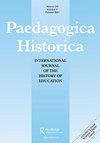克申施泰纳对民初教育思想的影响
IF 0.3
4区 教育学
Q4 EDUCATION & EDUCATIONAL RESEARCH
引用次数: 0
摘要
乔治·克申施泰纳(1854-1932)是世界知名的工作学校概念的倡导者。他的教育理念不仅在欧洲,而且在世界其他地区的小学和职业教育领域都得到了采纳。本研究旨在分析格奥尔格·克申施泰纳关于职业教育、公民教育、工作学校和教学的观点如何被共和初期的土耳其教育思想所诠释和采纳。此外,它的目的是仔细审查他的教学法对教育实践的影响。特别是在1908年后,以工作为基础的教育和应用教育等概念对工作教育理念的建立起了重要作用。随着1923年土耳其共和国的宣布,土耳其的行政人员采用了这种职业学校原则作为其小学的官方教学指导方针。在此期间,乔治·克申施泰纳的出版物被翻译成土耳其语,他的工作学校在土耳其教育学中获得了越来越重要的地位。哈利勒·f·卡纳德、İsmail H. Tonguç和Hıfzırrahman R. Öymen等土耳其教育家在采纳他的思想方面发挥了重要作用。克申施泰因的教育方法更直接地应用于日本的教师教育,特别是在1935年至1954年之间。本文章由计算机程序翻译,如有差异,请以英文原文为准。
Georg Kerschensteiner’s influence on the pedagogical thought of the Early Republic era in Türkiye
ABSTRACT Georg Kerschensteiner (1854–1932) was a world-renowned proponent of the work school concept (die Arbeitsschule). His educational philosophy was adopted not only in Europe but also in other parts of the world, both in the fields of primary school and vocational education. This study aims to analyse how Georg Kerschensteiner’s views on vocational education, civic education, work school, and teaching were interpreted and adopted by the Early Republican period Turkish pedagogical thinking. Moreover, it aims to scrutinise the impact of his pedagogy on educational practices. In the post-1908 period, in particular, concepts such as work-based education and applied education played an important role in the establishment of the idea of work education. With the proclamation of the Turkish Republic in 1923, Turkish administrators adopted such vocational school principles as the official pedagogical guidelines for its primary schools. During this period, Georg Kerschensteiner’s publications were translated into Turkish, and his work school gained an increasingly important place in Turkish pedagogy. Turkish educators such as Halil F. Kanad, İsmail H. Tonguç, and Hıfzırrahman R. Öymen played an important role in the adoption of his ideas. The Kerschensteinerian approach to education was more directly applied to teacher education in Türkiye, particularly between 1935 and 1954.
求助全文
通过发布文献求助,成功后即可免费获取论文全文。
去求助
来源期刊

PAEDAGOGICA HISTORICA
Multiple-
CiteScore
0.90
自引率
40.00%
发文量
72
期刊介绍:
"Paedagogica Historica is undoubtedly the leading journal in the field. In contrast to a series of national journals for the history of education, Paedagogica Historica is the most international one." A trilingual journal with European roots, Paedagogica Historica discusses global education issues from an historical perspective. Topics include: •Childhood and Youth •Comparative and International Education •Cultural and social policy •Curriculum •Education reform •Historiography •Schooling •Teachers •Textbooks •Theory and Methodology •The urban and rural school environment •Women and gender issues in Education
 求助内容:
求助内容: 应助结果提醒方式:
应助结果提醒方式:


